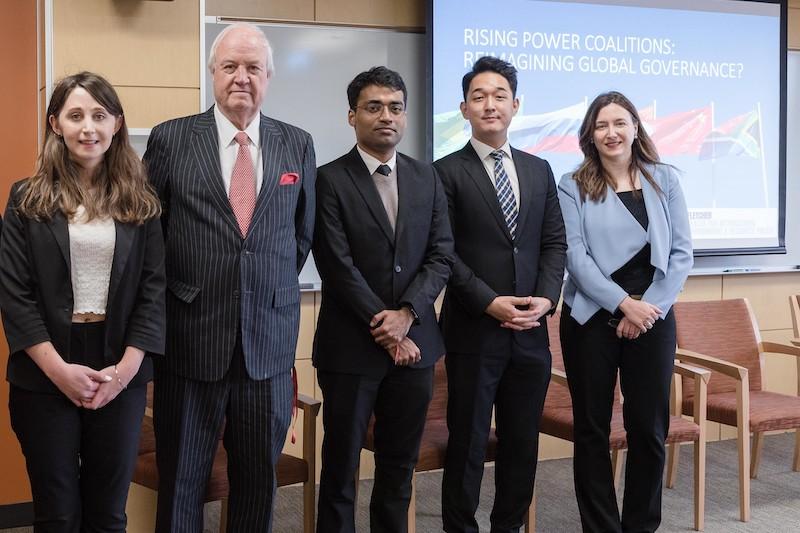-

Hear from Monica Toft, Academic Dean
Learn how Monica Toft, Academic Dean, is shaping the study of global affairs and diplomacy at Fletcher.
Hear from Prof. Toft -

Explore Fletcher academics in action
Fletcher Features offers insights, innovation, stories and expertise by scholars.
Get global insights -
Get application tips right from the source
Learn tips, tricks, and behind-the-scenes insights on applying to Fletcher from our admissions counselors.
Hear from Admissions -

Research that the world is talking about
Stay up to date on the latest research, innovation, and thought leadership from our newsroom.
Stay informed -
Meet Fletcherites and their stories
Get to know our vibrant community through news stories highlighting faculty, students, and alumni.
Meet Fletcherites -

Forge your future after Fletcher
Watch to see how Fletcher prepares global thinkers for success across industries.
See the impact -

Global insights and expertise, on demand.
Need a global affairs expert for a timely and insightful take? Fletcher faculty are available for media inquiries.
Get in Touch
Rising Power Alliances Project Investigates BRICS
CIERP initiative analyzes contemporary coalition building

Mihaela Papa is no stranger to multinational coalition building. During her PhD at The Fletcher School, Papa MA03 PhD10, researched international negotiation and conflict resolution. Now, she applies her scholarship as co-investigator on the Rising Power Alliances Project and an adjunct assistant professor in sustainable development and global governance.
Her career began in the Croatian foreign ministry at a time when the country was mobilizing to join the European Union. During a postdoctoral fellowship at Harvard Law School, she became interested in nonwestern approaches to international relations, namely with the coalition building between Brazil, Russia, India, China, and South Africa––otherwise known as the BRICS nations. Papa moved to Shanghai to serve as a visiting scholar at the Center for BRICS Studies at Fudan University, and this experience had her rethinking how global governance works and wanting to understand innovations in multilateralism.
“My sense of that was the same as when I was in Croatia when the government wanted to join the EU,” said Papa. “All the most ambitious people worked on the EU and configurations of transatlantic cooperation. Here I saw the same thing happen where the most driven and innovative people were working on BRICS. I saw there was something more about this. There was this real excitement for building a new type of coalition and innovating in what was a multilateral system that was traditional, old, and not working very well.”
“When I came back, I wanted to see why nobody was working on this; then I realized that people were not aware of how important it was,” she added.
Alongside Academic Dean Kelly Sims Gallagher, Papa proposed a new research project through the Center for International Environment & Resource Policy (CIERP) to the highly competitive federally funded Minerva Research Initiative, and CIERP was awarded a multi-year grant. The CIERP project is organized around three key themes: defining alliances from the BRICS countries’ perspectives, investigating rising powers’ coalitional behavior across key strategic areas, and analyzing the United States’ policy response to these alliances.
By analyzing new coalitional behavior, the team gathered and developed essential insight into many of the world’s most pressing geopolitical questions. The team has developed the BRICS convergence index, forthcoming in the European Journal of International Relations, to better understand where cooperation among the coalition is strong, and around which issues the member countries coalesce. It also identified where the group’s policies diverged from U.S. global agendas. The group investigated in detail BRICS countries’ efforts to de-dollarize the global financial system and published a volume on the topic with Cambridge University Press two weeks before Russia invaded Ukraine. As countries around the world discussed sanctions, Papa and her team were consulted for insight on the coalition.
One of the project’s core areas seeks understanding around the changing nature of alliances and coalitions—how are international politics realigning? Having studied BRICS for years, Papa knows that the potential for global reverberations when BRICS organizes is substantial.
“If you have five states that are over 40% of the population and more than 30% of the world’s gross domestic product (GDP) and new countries lining up to join the group, you have the critical mass to change the rules, to change global governance—the shape of it, how it operates. That’s very powerful,” said Papa.
Papa has been pleased by the cross-sectoral interest in the research, and stakeholders across the globe are paying attention. She has spoken on panels alongside White House staff, and papers published by the team have caught the attention of government officials within BRICS countries.
Throughout her career as a scholar, Papa has worked at various institutions, and she’s found strong support for this kind of research at Fletcher.
“Fletcher is very open-minded and innovative. Fletcher has the very best research on international negotiations and sustainable development. When you think about the research that was done before on Russia, or China, a lot of the debate was in the international security realm, and it was in the realist camp,” she said. “We came in and looked at the rise of new powers from a negotiation perspective, and from a coalition building perspective.”
“At the same time, Fletcher has stellar students,” she added, “both in terms of diversity—you can get students who speak the languages of the countries—and in terms of quantitative and qualitative skills. The overall environment is very supportive.”
Read more about the Rising Powers Alliances project.

